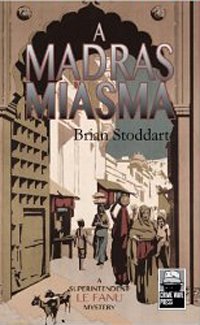The setting is 1920, in the teeming city of Madras (present day Chennai) on the south eastern coast of India. Superintendent Christian Le Fanu of the Indian Police Service has been called to the banks of a filthy city canal which is, in reality, little more than an open sewer. Just beneath his feet, her head anchored obscenely in the mud of the putrid waterway, is the body of a white woman. Thus begins a nightmare for the mild mannered English policeman and decorated former soldier. Madras is one of the less fashionable colonial outposts in India, and is very much looked down on as a third rate posting by those servants of empire lucky enough to be in New Delhi, or even the former capital, Calcutta.
Le Fanu – LF to his friends – did his bit in the trenches of the Western Front, but opted to return to his police work in India rather than be reunited with his estranged wife in England. He lives in some comfort in a suburban villa, and has a mutually satisfying relationship with his Anglo-Indian housekeeper, Roisin. The woman in the canal is soon identified as that of Jane Carstairs, a member of of what local Europeans call The Fishing Fleet, a group of young British women in India hoping to catch one from the shoal of eligible bachelors working for the colonial administration and assorted trading companies.
When the autopsy reveals that Miss Carstairs was not only strangled, but that her bloodstream contains a significant amount of morphine, Le Fanu realises he has a potentially explosive case on his hands. Not only are the natives of Madras becoming more and more fractious, as activists such as Mohandas Gandhi make them aware of the possibility of independence, but the British are bitterly divided between modernisers and die-hard conservatives. Le Fanu belongs to the former camp, as does his ultimate boss, the Inspector General. However, Commissioner Jepson – who we might call his Line Manager in modern terms – is very much of the latter persuasion.
When an industrial protest goes terribly wrong, and there is literally blood on the sand, Le Fanu is forced to make a heart-breaking personal decision as well as put his career on the line by pursuing his investigation, even though it takes him right to the heart of the British colonial establishment. With the help of his right hand man, Sergeant Habibullah, LF establishes a case which implicates some seriously important individuals. Inspector General Wilson backs LF to the hilt, but he is days short of leaving his position, and the two men are beset my any number of influential figures trying to put a smokescreen between the truth of Jane Carstairs’ murder and the public.
As one would expect from a distinguished Australian academic who has written and lectured on the subject of Indian history, the background is effortlessly convincing. In Le Fanu, Stoddart has created a character with huge potential for development, both as a person and as a witness to momentous historical events. In purely technical terms, the plotting of the book is as impressive as the narrative style, and the description of the bloody end to the industrial protest is as gripping as anything I have read in a long while. The ending is very clever without being showy, and I will certainly be on the lookout for the next chapter in the career of Christian Jolyon Brenton Le Fanu, MC.
Crime Wave Press
Print/Kindle
£4.27
CFL Rating: 5 Stars
